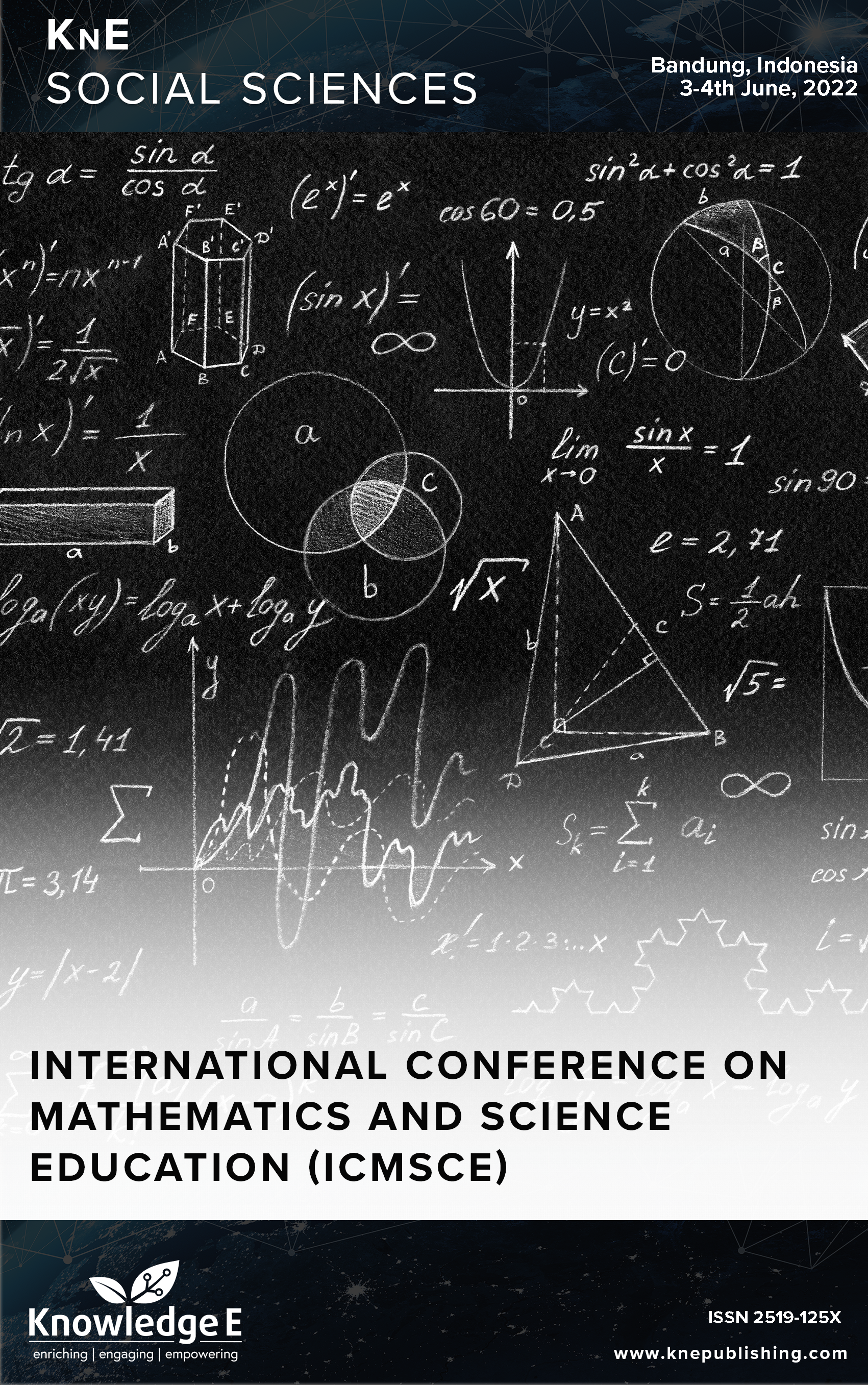Innovation Learning Process in New Normal Era: Effectiveness of Online Proctored Examination (OPE) Technology to Increase Student Honesty in Physics Lecture
DOI:
https://doi.org/10.18502/kss.v9i8.15643Abstract
This study aims to determine the effectiveness of online proctored examination (OPE) technology in increasing students’ honesty levels. This research is a pre-experiment using one group pre-test and post-test design methods. OPE in Physics lectures was conducted on a group of randomly chosen 34 students. The level of honesty of students was measured using the autoproctor application, which is used in the implementation of the OPE. Then, the level of honesty before using OPE at meeting 1 was compared with after getting used to using OPE at meeting 6. The data were analyzed using paired sample t-tests and quantitative description. The results show that OPE technology was effective in increasing students’ honesty levels. This is indicated by the results of the paired sample t-test using the Wilcoxon test of 72.5 with a p-value of < 0.001. In addition, the average increase in the pre-test and post-test honesty scores recorded by the autoproctor application was 64.9% for the pre-test and 92.6% for the post-test. The effectiveness of OPE in learning is supported by the results of responses to a questionnaire that measures the relative advantage, compatibility, ease of use, trialability, and observability of using OPE. The results of the questionnaire responses show an average score of 78.7, namely the use of OPE was classified as effective in learning. The results of this study can be used as a reference for teachers and academic practitioners to increase the level of honesty of students in online exams using OPE technology.
Keywords: innovation learning process, OPE Technology, Student Honesty
References
Stanley TJ. The millionaire mind. J Chem Inf Model. 2013;53(9):1689–99. DOI: https://doi.org/10.1021/ci400128m
Raman R, B S, G V, Vachharajani H, Nedungadi P. Adoption of online proctored examinations by university students during COVID-19: innovation diffusion study. Educ Inf Technol. 2021;26(6):7339–58. DOI: https://doi.org/10.1007/s10639-021-10581-5
Dhiu KD, Noge MD, Laksana DN. Pendampingan mengelola pembelajaran daring bagi guru-guru di citra bakti school. Jurnal Abdimas Ilmiah Citra Bakti. 2021;2(2):224– 34. DOI: https://doi.org/10.38048/jailcb.v2i2.390
Christiana A, Kristiani A, Pangestu S. Kecurangan pembelajaran daring pada awal pandemi: dimensi fraud pentagon. Jurnal Pendidikan Akuntansi Indonesia. 2021;19(1):66–83. DOI: https://doi.org/10.21831/jpai.v19i1.40734
Herliana F, Farhan A, Elisa M, Syukri M, Mahzum E. Syukri, and E. Mahzum, “Perception of novice learners using blended learning approach during the covid-19 pandemic.,”. J Phys Conf Ser. 2021;2019(1):12032. DOI: https://doi.org/10.1088/1742-6596/2019/1/012032
Elsalem L, Al-Azzam N, Jum’ah AA, Obeidat N. Remote E-exams during Covid- 19 pandemic: A cross-sectional study of students’ preferences and academic dishonesty in faculties of medical sciences. Ann Med Surg (Lond). 2021 Feb;62:326– 33. DOI: https://doi.org/10.1016/j.amsu.2021.01.054
Herliana F, Farhan A, Made Astra I. The relationship of motivation and self-regulated learning through blended learning in the covid-19 era. Jurnal Ilmu Pendidikan Fisika. 2022;7(1):50–9. DOI: https://doi.org/10.26737/jipf.v7i1.2137
M.E.& A. Genis-Gruber, Assessment of online exam system perception in Covid-19 pandemic era., 2021. DOI: https://doi.org/10.4018/978-1-7998-8661-7.ch005
Dendir S, Maxwell RS. Cheating in online courses: evidence from online proctoring. Comput Hum Behav Rep. 2020;2:100033. DOI: https://doi.org/10.1016/j.chbr.2020.100033
Sugiyono, Metode penelitian kuantitatif, kualitatif dan R&D. Alfabeta, Bandung, 2011.
Raman R, Achuthan K, Nair VK, Nedungadi P. Virtual Laboratories- A historical review and bibliometric analysis of the past three decades. Educ Inf Technol. 2022;27(8):11055–87. DOI: https://doi.org/10.1007/s10639-022-11058-9
Farhan A, Wahyuni A, Herliana F, Akhyar A. Transition of learning physics technology using virtual practicum to high school physics teachers in aceh barat district. J Phys Conf Ser. 2021;2019(1):12056. DOI: https://doi.org/10.1088/1742-6596/2019/1/012056
Reedy A, Pfitzner D, Rook L, Ellis L. Responding to the Covid-19 emergency: student and academic staff perceptions of academic integrity in the transition to online exams at three Australian universities. Int J Educ Integr. 2021;17(1):9. DOI: https://doi.org/10.1007/s40979-021-00075-9
Kasli E, Farhan A, Susanna S, Herliana F, Wahyuni S. “Overview of teacher ability using core type cooperative model with blended learning method to increase student learning outcomes.,” Jurnal Penelitian Pendidikan IPA. vol. 8, no. 2 SE-Research Articles, pp. 1012–1017, 2022. https://doi.org/10.29303/jppipa.v8i2.1241. DOI: https://doi.org/10.29303/jppipa.v8i2.1241
Khoirun Nisa Nurul Fitri. “Jago mentor solusi pembelajaran jarak jauh pada masa pandemi covid-19.,” DIAJAR: Jurnal Pendidikan dan Pembelajaran. vol. 1, no. 2 SEArticles, pp. 176–184, 2022. DOI: https://doi.org/10.54259/diajar.v1i2.709
Tripathi AM, Kasana R, Bhandari R, Vashishtha N. “Online examination system bt - smart trends in computing and communications.,” Presented at the (2022). DOI: https://doi.org/10.1007/978-981-16-4016-2_67
Jagadesh Kumar M. COVID-19: how institutions, teachers and students in india have geared up for online education? IETE Tech Rev. 2020;37(3):221–2. DOI: https://doi.org/10.1080/02564602.2020.1774977
AlAjmi A. “Online examination systems, presenting cheating and the ethical, social and professional view of them bt - technologies, artificial intelligence and the future of learning Post-Covid-19: the crucial role of international accreditation.,” Presented at the (2022). DOI: https://doi.org/10.1007/978-3-030-93921-2_10
F. Herliana, A. Farhan, and S. Rizal, “The effect of self-regulation and motivation to outcomes learning using blended learning approach.,” Turkish Journal of Computer and Mathematics Education, 4226 Research Article. vol. 12, no. 6, pp. 4226–4233, 2021.
Rahmati R, Yusrizal Y, Halim A, Herliana F, Rizal S. “Level of knowledge and understanding of state senior high school science teachers in constructing ‘hot questions,”’ Jurnal Penelitian Pendidikan IPA. vol. 8, no. 2 SE-Research Articles, pp. 467–474, 2022. https://doi.org/10.29303/jppipa.v8i2.1133. DOI: https://doi.org/10.29303/jppipa.v8i2.1133
Baig M, Gazzaz ZJ, Farouq M. Blended Learning: the impact of blackboard formative assessment on the final marks and students’ perception of its effectiveness. Pak J Med Sci. 2020;36(3):327–32. DOI: https://doi.org/10.12669/pjms.36.3.1925
Farhan A, Herliana F, Evendi E, Devy NK, Mauliza F. “The implementation of ‘guru penggerak’ (organizer teachers) concept to innovation of the discussion methods in thermodynamics course,” Jurnal Penelitian & Pengembangan Pendidikan Fisika. vol. 7, no. 1 SE-Articles, p. 2021. https://doi.org/10.21009/1.07101. DOI: https://doi.org/10.21009/1.07101
El Iq Bali MM, Baharun H, Madanibillah A, et al. “Innovative learning media based on e-learning in the new normal era.,” Proceedings of the International Conference on Industrial Engineering and Operations Management. pp. 6987–6993, 2021. DOI: https://doi.org/10.46254/AN11.20211210
Hasibuan A, Jamaludin J, Yuliana Y, et al. E-Business: Implementasi, Strategi dan Inovasinya. Yayasan Kita Menulis; 2020.

